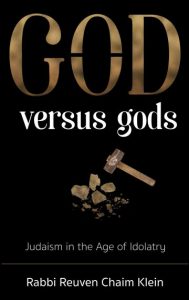 God versus gods: Judaism in the Age of Idolatry
God versus gods: Judaism in the Age of Idolatry
Rabbi Reuven Chaim Klein
Mosaica Press
For 12 years, I’ve served as the administrator of the OU’s Nach Yomi, the two-year cycle of Neviim and Kesuvim (Prophets and Writings). As a result, I’ve had the good fortune to review Nach half a dozen times. One thing that’s still striking, even after repeated readings, is the ubiquity of idolatry.
We don’t really understand the lure of avodah zara in Biblical times. Sure, we have to contend with the possibility of assimilation, and we understand the forced conversions imposed in earlier generations, but the idea that people can be tempted by a virtually irresistible force to worship idols? To pass their children through fire? We just don’t get why people would want to do that, let alone risk capital punishment (or damnation) for such a thing.
Two pieces of gemara help to enlighten us: (1) In tractate Sanhedrin (102b), the Talmudic sage Rav Ashi disparaged the Biblical king Menashe for being led to idolatry. Menashe appeared to Rav Ashi in a dream and told him, “If you had lived in my day, you’d have picked up the hems of your garment to run after idols!” (2) In tractate Yoma (69b), the Talmud describes how the Anshei Knesses HaGedolah prayed for – and were granted – the ability to seriously reduce the desire for idolatry. It is implicit there that the idolatrous urge was until that point comparable to the sexual urge. This perhaps makes the Bible-era temptation to worship idols slightly less puzzling.
Idolatry and the people’s interactions with it are so integral to the Books of the Neviim that I daresay one cannot fully appreciate the narrative, nor the prophets’ continual exhortations, without at least an intellectual understanding of what it was that motivated so much of our history. This is where God versus gods comes in. (The editor in me is bothered by the lowercase words in the title but the Jewish educator in me is gratified by how clearly the title differentiates between the Divine and the profane.)
Subtitled Judaism in the Age of Idolatry, God versus gods outlines the parallel developments of these conflicting ideologies. The work is broken down by era. The first of these sections (the second overall, following the introduction) addresses the origins of idolatry in the time of Adam’s grandson Enosh and its development through Avraham’s promotion of monotheism in a world turned idolatrous. The next part continues with the idolatrous experience in Egypt and throughout the period of the Exodus, including Egypt’s gods, the golden calf, and Baal Peor.
Moving from Chumash to Navi, God versus gods elucidates the Jews’ interactions with idolatry during the conquest of the land and the subsequent periods of rule under the Judges and the Kings. (The post-division kingdoms of Judah and Israel are addressed in separate sections.) Finally, we are enlightened as to the situation as it existed in the post-exile periods described in various Books of Kesuvim, such as Esther and Ezra.
The status of idolatry in Biblical times is not the black-and-white dichotomy that most might assume. There was a gray area in the form of improper worship directed towards Hashem. The intention of the world’s first idolators, according to Rambam, was to honor Hashem by praising His creations, like the sun and the moon; we all know how that turned out. Later, Jews would also “lose the plot” by worshipping Hashem in inappropriate fashions that, though ill-advised, would not technically qualify as idolatry.
What was the intention of those who built the golden calf? What was Yeravam’s intention in replicating the golden calf – in duplicate! – following the civil war that divided the nation? How are we to understand the ephod that was made by Gidon, or Micah’s idol, for which Moshe’s own grandson served as priest? And why does Tanach sometimes attribute idolatry to unambiguously righteous people, like Shlomo? A thoughtful consideration of such questions is important to truly understanding the narrative. God versus gods provides thorough analyses of these and comparable matters.
While traditional sources describing the various pagan deities are certainly an important part of the presentation, God versus gods goes far beyond these familiar peirushim. Yes, midrashim, gemaras and Rishonim are fully represented, but God versus gods also incorporates copious contemporary and academic sources. While academia may not be in lockstep with our traditional understandings, it’s actually quite gratifying to see how the diverse sources complement one another. (See, for example, how the gemara’s aforementioned explanation of the downshift in idolatry interplays with modern philosophical concept of an “Axial Age.”)
God versus gods includes an appendix that, while not indispensable for understanding the main part of the work, provides a gratifying experience in its own right. Titled Encyclopedia of Gods in the Bible, this section describes in great detail – again, from both traditional and academic sources – the forms of the various idols, their method of worship, Biblical people and places named for these deities, and more. Not only will the reader acquire a fuller understanding of asheira worship (for example), he will see how Mordechai and Esther’s names are derived from Marduk and Ishtar, Babylonian deities. (We may use these as “religious” names but to them, these were their “secular” names!) The book of Apocrypha called “Bel and the Dragon” is not overlooked, nor is the idol Baal Zevuv’s role as “Lord of the Flies.” It’s quite thorough.
Throughout the work, Rabbi Klein teases a forthcoming second volume that will delve more deeply into categories of idolatry, how the Torah transitions man from idolatry, the significance of names, and more. I, for one, eagerly anticipate this addition to the existing volume.
————————
Rabbi Jack Abramowitz is Torah Content Editor at the Orthodox Union. He is the author of six books, including The Tzniyus Book and The Taryag Companion. His latest work, The God Book, is available from OU Press as well as on Amazon.
The words of this author reflect his/her own opinions and do not necessarily represent the official position of the Orthodox Union.

